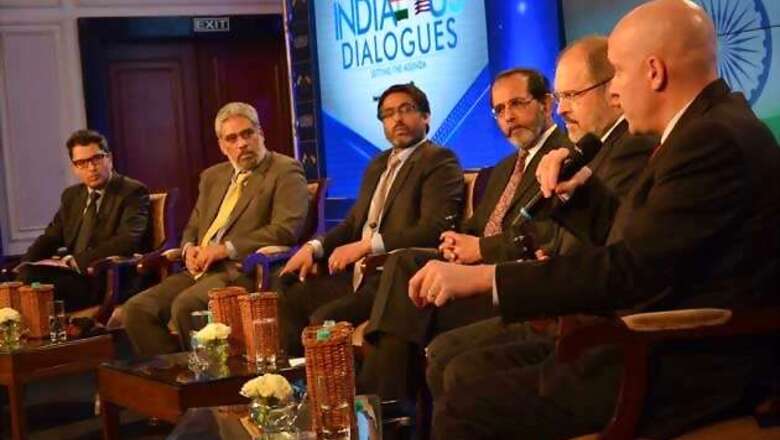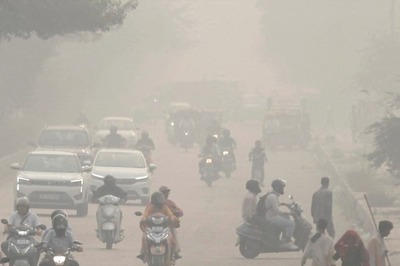
views
New Delhi: The inaugural session of the Indo-US dialogue jointly organised by the Network18 and the Observer Research Foundation (ORF) to mark the visit of the US President Barack Obama to India expressed confidence that Prime Minister Narendra Modi is capable of taking the relationship to a newer and greater level.
The two day seminar which will discuss the past and future of Indo-US relationship is being attended by some of the top policymakers from both India and America.
The inaugural session moderated by CNN-IBN's Deputy Executive Editor Zakka Jacob witnessed a lively exchange of serious ideas and thoughts. India's top strategic affairs expert C Rajamohan who is also a distinguished fellow at the ORF, former Indian Ambassador Rakesh Sood, former US Assistant Secretary of Defence Vikram Singh, Peter Tichansky of BCIU and Rick Rossow exchanged their ideas, dreams and doubts about the future of relationship between India and US.
The opening session discussed strategic partnership, Pakistan, defence and technology, trade and commerce and climate change.
Opening the session, Rajamohan expressed confidence that PM Modi can take the relationship forward. He said "the relationship has moved from symbolism to substance. Earlier there was a drift. Modi's visit to the US has been able to arrest that drift. It has signaled that change. Now, we have to advance the relationship".
Former US Assistant Secretary of Defence Vikram Singh said the Indo-US trade has picked up steadily in the recent past and it has now touched US $10 billion and America is also the largest supplier of defence equipments to India. He said "it is a highly positive sign".
Former Indian ambassador and nuclear negotiator Rakesh Sood praised former prime minister Atal Bihari Vajpayee for transforming the Indo-US relationship. Sood said, "PM Vajpayee changed US-India relationship from 'estranged democracies' to 'natural allies'."
On the nuclear deal between both the country, Sood said, "Nuclear cooperation plateaued, partly because of India's 2010 nuclear liability bill. There's a certain commitment to taking the relationship forward and operationalising civil-nuclear cooperation."
The former ambassador also lauded former US President George Bush saying he was committed to a strong India providing stability in the region and beyond.
He said "Stability is very important. The PM Modi is taking it forward".
Peter Tichansky also endorsed Sood's views. He said "that trip changed all that. There is a positive aspect now". He said that the Indo-US relationship is once again 'high on people's mind".
Rick Rossow felt that any bilateral can be taken to greater and newer heights only at the leadership level. He also spoke about the issue of Pakistan.
Commenting on this Rajamohan said "We need to sit down and talk about Pakistan". Ambassador Sood, who has a long experience in bilateral relationships and strategic affairs, spoke about the long history of US -Pak relationship. Commenting on Indo-US, he said "There has been a long history of 'stop' and 'go'.
Explaining India's strong and at the same time precarious position, he said "The arc of instability starts at Pakistan and goes beyond the Middle East on the Western side. On the Eastern side, world's major powers are jostling for influence. India is between these two".
Joining the debate at this juncture, Rick Rossow said "no single country can dominate Asia in future".
Rajamohan felt that Indo-US-China relationships are strong. However he added that US and China have a strong relationship and India's ties are not that strong with the both.
Talking about possibility of a stronger defence ties with the US, Vikram Singh said "it happens at three levels. One is leadership. You need a strong leadership. Secondly, you need who can take the deals forward and the Public Sector and Private Sector partnership".
They also spoke about the role of Russia and India's historic defence ties with it. Sood said "US has now emerged as the single largest supplier of defence equipments. However Russia still supplies two-thirds of our defence equipments".
He stressed on the need to have a strong joint development, research and manufacturing of equipments instead of just being the 'sellers' and 'buyers'.
Talking about PM Modi's initiatives, Peter Tichansky said "audacity and impatience of Modi are extremely welcome. He wants to do it".
Criticising India's Nehruvian model of economy he said "We (his institute or body) visited India in the early 1960s. Our report to the US Congress said that even if India moves its policies a fraction, India would be one of the top five economies in the World by the year 2000. Unfortunately, Indian bureaucracy is too complex and it has delayed the growth".
The opening session also discussed the most contentious issues of World Trade Organisation (WTO) negotiations and the Climate Change talks.
India and US are on the opposite sides as far as these two issues are concerned. The dialogue hoped that the Obama - Modi leadership would move forward on this.

















Comments
0 comment